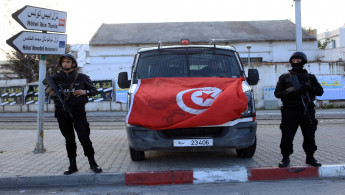Red armbands for Tunisian police in work conditions protest
Tunisian police personnel, who say they work long hours in difficult conditions and in return for low wages, hope the Interior Ministry will resume negotiations with them.
3 min read
Tunisian security personnel are under increasing stress after wave of terror attacks [Anadolu]
For the second day in a row, Tunisian police officers are wearing red armbands to protest the delay in the implementation of previous agreements related to their working conditions, and against the 12-hour shifts that the Interior Ministry activated following the terrorist attack in Sousse.
The police officers complain the long working hours have affected their family lives, and have been calling for the system to be revised to include overtime pay.
The Interior Ministry announced the 12-hour shift system would be suspended as of Tuesday.
However, according to police trade union representatives, the demands of the police officers go beyond this and are related to wages and working conditions that not been met yet by the authorities.
The police and security officers have made many labour-related gains since the ouster of the Ben Ali regime in January 2011, including pay rises, promotions, and better work conditions and career advancement options.
However, many problems remain, prompting them to demand more improvements and for some decisions implemented in the face of counter-terrorism threats and other contingencies to be revised.
Mohammed Ali al-Obeidi, secretary general of the National Security Trade Union in Bardo, told al-Araby al-Jadeed that the 12-hour shift system hurt many security personnel. Many, he continued, were no longer able to be with families, causing stress and tensions in their homes.
Obeidi said another reason the police officers are wearing the protest armbands is to put pressure on the government to implement what he said were their legitimate demands, which the supervision authority had agreed to.
The trade union official pointed out that no fewer than 28,700 officers are hoping the Interior Ministry will heed their call, while stressing that they would continue to work and deal with the terrorist threat despite all difficulties.
Mahdi Chaouch, official spokesperson for another police trade union, told al-Araby al-Jadeed the officers hope to resume negotiations with the Interior Ministry, saying they have stalled since the tenure of the former minister Lotfi Ben Jeddo.
Chaouch said the gains achieved are not up to their ambitions, explaining that the wages are nowhere close to the wages paid to the army and even school teachers. He also stressed that there are large differences in the quality of health services between the army and the police, even though security personnel often work around the clock including on holidays.
Chaouch said their next move would be to hold a press conference on Thursday, followed by protests in the regions to be held by trade unions but not the security personnel, which he said would continue to work normally. He then vowed to hold a large protest should the Interior Ministry ignores the demands of its personnel.
The police officers complain the long working hours have affected their family lives, and have been calling for the system to be revised to include overtime pay.
The Interior Ministry announced the 12-hour shift system would be suspended as of Tuesday.
However, according to police trade union representatives, the demands of the police officers go beyond this and are related to wages and working conditions that not been met yet by the authorities.
The police and security officers have made many labour-related gains since the ouster of the Ben Ali regime in January 2011, including pay rises, promotions, and better work conditions and career advancement options.
However, many problems remain, prompting them to demand more improvements and for some decisions implemented in the face of counter-terrorism threats and other contingencies to be revised.
Mohammed Ali al-Obeidi, secretary general of the National Security Trade Union in Bardo, told al-Araby al-Jadeed that the 12-hour shift system hurt many security personnel. Many, he continued, were no longer able to be with families, causing stress and tensions in their homes.
Obeidi said another reason the police officers are wearing the protest armbands is to put pressure on the government to implement what he said were their legitimate demands, which the supervision authority had agreed to.
The trade union official pointed out that no fewer than 28,700 officers are hoping the Interior Ministry will heed their call, while stressing that they would continue to work and deal with the terrorist threat despite all difficulties.
Mahdi Chaouch, official spokesperson for another police trade union, told al-Araby al-Jadeed the officers hope to resume negotiations with the Interior Ministry, saying they have stalled since the tenure of the former minister Lotfi Ben Jeddo.
Chaouch said the gains achieved are not up to their ambitions, explaining that the wages are nowhere close to the wages paid to the army and even school teachers. He also stressed that there are large differences in the quality of health services between the army and the police, even though security personnel often work around the clock including on holidays.
Chaouch said their next move would be to hold a press conference on Thursday, followed by protests in the regions to be held by trade unions but not the security personnel, which he said would continue to work normally. He then vowed to hold a large protest should the Interior Ministry ignores the demands of its personnel.





 Follow the Middle East's top stories in English at The New Arab on Google News
Follow the Middle East's top stories in English at The New Arab on Google News
![Netanyahu furiously denounced the ICC [Getty]](/sites/default/files/styles/image_330x185/public/2024-11/GettyImages-2169352575.jpg?h=199d8c1f&itok=-vRiruf5)
![Both Hamas and the Palestinian Authority welcomed the ICC arrest warrants [Getty]](/sites/default/files/styles/image_330x185/public/2024-11/GettyImages-2178351173.jpg?h=199d8c1f&itok=TV858iVg)
